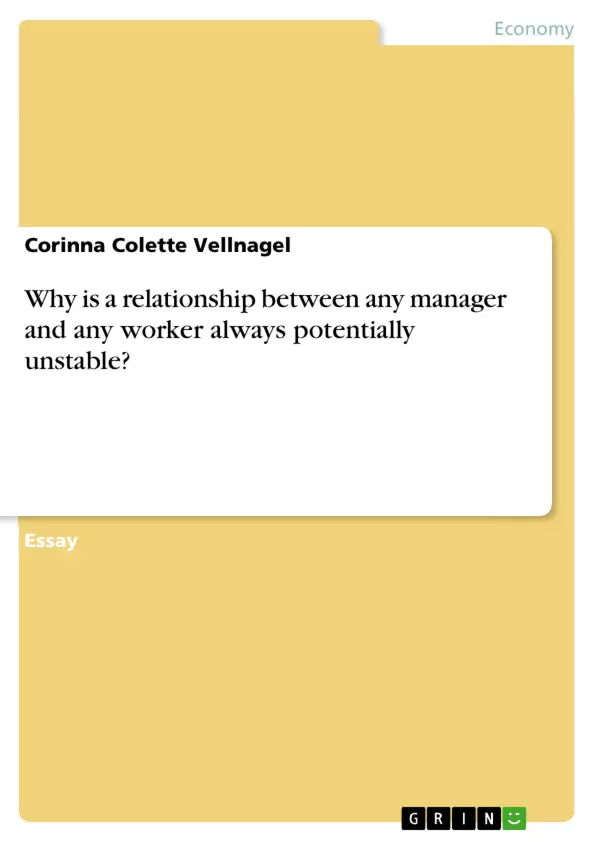Like every other relationship, the relationship between any manager and any worker has ever since been complex and not easy. It is, amongst other things, affected by jealousy and resentment in terms of salary, responsibility or knowledge and is based on the so-called “psychological contract” which “deals with implicit reciprocal promises and obligations” (Cullinane et al.: 2006, p. 115). As soon as people sign a labour contract, they also “sign” a psychological, an unwritten contract which mainly contains assumptions and beliefs of the two parties (employer and employee) (Rousseau: 1995). “This mental model provides a stable understanding of what to expect in the future and guides efficient action without much need for practice.” (Rousseau: 2004, p. 121)
Additional to the differing assumptions and beliefs, goals, commitment, satisfaction and objectives of the two parties vary incredibly. But what are the main reasons that make this relationship so unstable? This work deals with the evaluation of the cause of the inconsistent relation between managers and workers; and concludes with a short review.
1 Introduction
Like every other relationship, the relationship between any manager and any worker has ever since been complex and not easy. It is, amongst other things, affected by jealousy and resentment in terms of salary, responsibility or knowledge and is based on the so-called “psychological contract” which “deals with implicit reciprocal promises and obligations” (Cullinane et al.: 2006, p. 115). As soon as people sign a labour contract, they also “sign” a psychological, an unwritten contract which mainly contains assumptions and beliefs of the two parties (employer and employee) (Rousseau: 1995). “This mental model provides a stable understanding of what to expect in the future and guides efficient action without much need for practice.” (Rousseau: 2004, p. 121)
Additional to the differing assumptions and beliefs, goals, commitment, satisfaction and objectives of the two parties vary incredibly. But what are the main reasons that make this relationship so unstable? This work deals with the evaluation of the cause of the inconsistent relation between managers and workers; and concludes with a short review.
2 The Manager-Worker Relationship as an unstable Entity
The already mentioned potentially unstable relationship between managers and workers is getting caused by different reasons. One theory that deals with this relationship is the so-called “Principal-Agent-Theory”. The main focus of this theory lies on the different amount of information each party has; which may lead to a constantly unstable relationship. Nevertheless, there are more approaches and cause studies which try to identify the reasons for the instability of that kind of relationship.
The principal-agent-theory, which has been introduced formally in the 1970s, deals with the contract type of instruction, more precisely it covers the division of labour within the manager (principal) – worker (agent) – relationship and points out characteristics appearing between any principal and any agent. The problem, which will be explain in the following, inevitably appears when any kind of principal hires an agent (Wang et al.: 2010). The relationship between a manager and worker is partly governed by each other’s behaviour and starts as soon as the psychological contract has been signed (Riley: 1996). Assuming that every manager and every worker has got different assumptions and ideas about the work content, the individual’s aims and company’s aims make it hard to build up a stable relationship.
It is no secret that there is an asymmetric distribution of information between the two players. The agent has got bigger scopes and information advantages in comparison to the principal. The following graph visualises the relationship considering the asymmetric information between the two sides and the self interest each party has in itself.
illustration not visible in this excerpt
Figure 1 : Asymmetric distribution of information (Oesterreich: 2009)
Frequently asked questions
What is the primary subject matter discussed in the text?
The text delves into the complexities and potential instability of the relationship between managers and workers, exploring the factors contributing to its often inconsistent nature.
What is the role of the psychological contract in the manager-worker relationship?
The "psychological contract," an unwritten agreement based on assumptions and beliefs, significantly impacts the relationship. It outlines reciprocal promises and obligations between the employer and employee, influencing expectations and actions.
What is the Principal-Agent-Theory, and how does it apply to the manager-worker dynamic?
The Principal-Agent-Theory focuses on the unequal distribution of information between the manager (principal) and the worker (agent). This asymmetry can lead to instability due to differing objectives and potential conflicts of interest.
What are the key sources of asymmetric information mentioned in the text?
The text identifies hidden characteristics, hidden action, and hidden intention as the primary sources of asymmetric information between managers and workers, which can be further compounded by adverse selection, moral hazard, and hold up.
What does the figure mentioned in the text illustrate?
Figure 1 visualizes the asymmetric distribution of information between the manager and the worker, highlighting the self-interest each party possesses.
What are some of the reasons why the relationship between managers and workers is unstable?
Reasons for the instability include differing assumptions and beliefs, varying goals and commitments, and the asymmetric distribution of information, as explored by the Principal-Agent-Theory.
- Arbeit zitieren
- B.A. Corinna Colette Vellnagel (Autor:in), 2010, Why is a relationship between any manager and any worker always potentially unstable?, München, GRIN Verlag, https://www.grin.com/document/163603



